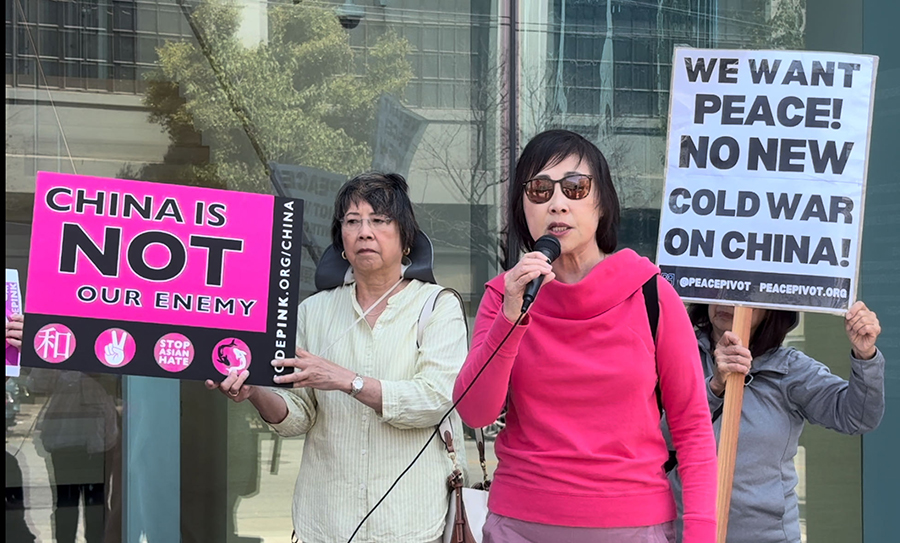PBS sparks outrage over shelving of film


Krista Chan, a San Francisco Bay Area resident, often contemplated the striking contrast between the region's affluence and the persistence of homelessness. That led her to seek answers in the documentary Voices from the Frontline: China's War on Poverty, now a focal point in a censorship controversy.
"How can we learn from what they did?" Chan asked. "After watching this documentary, I can tell you it took a lot of innovative business models, anti-corruption efforts, planned relocation, and incredible sacrifice and hard work on the part of the Chinese people."
Produced by PBS in 2019, the film, a collaboration between investment banker and China expert Robert Kuhn and Emmy-winning director Peter Getzels, documented China's methods to lift 800 million people out of extreme poverty in the past 40 years.
The film crew traversed China, engaging with locals for in-depth discussions and exploring bottom-up poverty-alleviation programs that played a crucial role in eradicating poverty for the final 100 million people impoverished.
However, after its initial release, the documentary faced harsh criticism from anti-China politicians, who accused it of portraying China in an overly positive light. Their pressure led to PBS taking down the film after a single showing.
PBS didn't respond to a request for comment from China Daily.
"I have seen this documentary and also traveled to China since I was a young child, witnessing firsthand how China has modernized and uplifted the poorest," said Chan, a volunteer with the "China is not our enemy" campaign of the anti-war group CodePink.
She cited the World Bank's 2022 report, which revealed that China contributed "close to three quarters of the global reduction" in extreme poverty over the past 40 years. "That's pretty incredible," she added.
One of the key takeaways for Chan from the film was the unwavering political will demonstrated by the Chinese government.
From young cadre in small villages to Chinese President Xi Jinping himself, "this has been their priority — to dedicate themselves to serving people through poverty alleviation," she explained. "Maybe that's the little secret PBS doesn't want us to know. They don't want us to know that China is working hard to meet people's needs while Americans grapple with student debt and a soaring cost of living."
The censorship of the documentary has sparked growing concern among peace and human rights activists. CodePink has been actively raising awareness of the film, hoping to encourage broader discussion among Americans.
The group stressed that the documentary provides not only insights into successful poverty alleviation but also a deeper understanding of China, a country often demonized in the public eye in the US.
"Censoring the documentary only serves those wanting to escalate divisions between the US and China," warned CodePink on its website. "By censoring Voices from the Frontline: China's War on Poverty, they also deprive the public of the opportunity to learn about poverty-alleviation policies that have changed millions of lives. Right now, amidst an increasingly dangerous climate crisis and high poverty rates, we need understanding and cooperation instead of censorship and fear."
The organization encourages the public to contact it for access to the full film. Last month, they delivered a petition with more than 5,800 signatures to PBS national headquarters in Virginia, demanding the release of the documentary. Similar petitions have been delivered to local PBS stations across the country, including in Chicago, Boston, Los Angeles, New York, Maine and New Hampshire.
In San Francisco, peace groups, including CodePink, Pivot to Peace, ANSWER Coalition, and Veterans for Peace, rallied on Saturday in front of KQED, a PBS affiliate, demanding the airing of the documentary.
"People deserve to see the positive things that are going on in China," said CodePink San Francisco organizer Cynthia Papermaster at the rally. "PBS is supposed to be an educational broadcasting company. So, show the film and have discussion."
Richard Becker, West Coast coordinator of the ANSWER Coalition, noted that poverty, once a prominent topic in US presidential campaigns, has been sidelined.
"Maybe there's a fear of the elite that if they showed something about how this miraculous transformation has happened in China — alleviating poverty for 800 million people — that you might have to start talking about poverty in the United States," he said.
Julie Tang, a retired San Francisco Superior Court judge and co-founder of Pivot to Peace, recounted her own experience witnessing China's transformation. When she visited China 20 years ago, she saw people living in shabby houses next to mountains in a dangerous environment. "Today, those things are no more. We see beautiful houses lined up," she said.
"People are prevented from seeing the truth of what's happening in China. It is a shame because a documentary like this can help ameliorate a lot of the tensions that are going on in the US-China relationship right now," said Tang.


































